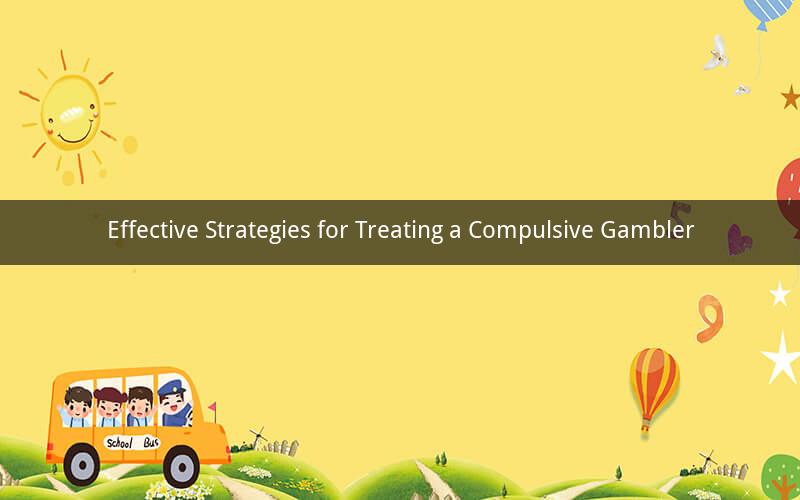
Compulsive gambling, also known as problem gambling, is a severe addiction that can have devastating consequences on an individual's life. It is essential to understand the nature of this addiction and the most effective ways to treat it. This article will delve into the various strategies and methods that can be employed to help a compulsive gambler overcome their addiction.
1. Understanding Compulsive Gambling
Compulsive gambling is characterized by an uncontrollable urge to gamble, despite negative consequences. This addiction can affect anyone, regardless of age, gender, or socioeconomic status. It is crucial to recognize the signs and symptoms of compulsive gambling to seek appropriate treatment.
1.1 Signs and Symptoms
- Continuously losing interest in hobbies and activities that were once enjoyable
- Lying to family and friends about gambling activities
- Borrowing money or selling possessions to fund gambling
- Feeling restless or irritable when unable to gamble
- Increasing the amount of money or time spent on gambling
- Risking everything, including relationships, career, and health, for the sake of gambling
1.2 Causes of Compulsive Gambling
Several factors can contribute to the development of compulsive gambling, including:
- Genetic predisposition
- Environmental influences, such as exposure to gambling at a young age
- Mental health issues, such as depression or anxiety
- Stress and trauma
2. Treatment Approaches for Compulsive Gamblers
Treating compulsive gambling involves a combination of therapy, support groups, and lifestyle changes. Here are some effective treatment approaches:
2.1 Cognitive Behavioral Therapy (CBT)
Cognitive Behavioral Therapy (CBT) is a widely used treatment for compulsive gambling. This therapy helps individuals identify and change negative thought patterns and behaviors associated with gambling. CBT can be conducted in individual or group settings and may include the following techniques:
- Identifying and challenging irrational beliefs about gambling
- Developing coping strategies to deal with triggers and cravings
- Learning to manage stress and anxiety without resorting to gambling
2.2 Motivational Interviewing
Motivational Interviewing (MI) is a therapeutic approach that aims to help individuals find their own motivation to change. This method is particularly effective for individuals who are initially resistant to seeking treatment. MI focuses on exploring the individual's ambivalence about changing their gambling behavior and helping them make a commitment to change.
2.3 Support Groups
Support groups, such as Gamblers Anonymous, provide a safe and supportive environment for individuals struggling with compulsive gambling. These groups allow individuals to share their experiences, learn from others, and develop coping strategies. Support groups can be a valuable source of encouragement and accountability.
2.4 Medication
In some cases, medication may be prescribed to help manage the symptoms of compulsive gambling. Antidepressants, mood stabilizers, and anti-anxiety medications may be used to address underlying mental health issues that contribute to the addiction.
2.5 Family Therapy
Family therapy can be beneficial for both the compulsive gambler and their loved ones. This type of therapy helps to improve communication, resolve conflicts, and develop strategies for supporting the gambler's recovery. Family therapy can also address the impact of gambling on the family unit and help rebuild trust and relationships.
3. Lifestyle Changes
In addition to therapy and support, making lifestyle changes can significantly improve the chances of overcoming compulsive gambling:
- Establishing a budget and avoiding gambling
- Limiting access to gambling opportunities, such as removing credit cards and closing online gambling accounts
- Engaging in healthy activities to fill the void left by gambling, such as exercise, hobbies, or socializing with non-gambling friends
- Seeking out professional help for underlying mental health issues
4. Conclusion
Treating a compulsive gambler requires a comprehensive approach that addresses the addiction itself, as well as the underlying factors that contribute to it. By combining therapy, support groups, lifestyle changes, and medication, individuals can overcome their addiction and rebuild their lives.
Questions and Answers:
1. What are the signs and symptoms of compulsive gambling?
Answer: Signs and symptoms of compulsive gambling include losing interest in hobbies, lying about gambling, borrowing money, feeling restless when unable to gamble, increasing the amount of money or time spent on gambling, and risking relationships and health for the sake of gambling.
2. What are some effective treatment approaches for compulsive gambling?
Answer: Effective treatment approaches for compulsive gambling include Cognitive Behavioral Therapy (CBT), Motivational Interviewing, support groups, medication, and family therapy.
3. How can lifestyle changes help in treating compulsive gambling?
Answer: Lifestyle changes, such as establishing a budget, limiting access to gambling, engaging in healthy activities, and seeking professional help for underlying mental health issues, can significantly improve the chances of overcoming compulsive gambling.
4. Can medication be used to treat compulsive gambling?
Answer: Yes, medication can be prescribed to help manage the symptoms of compulsive gambling, such as antidepressants, mood stabilizers, and anti-anxiety medications.
5. How can family therapy benefit a compulsive gambler and their loved ones?
Answer: Family therapy can improve communication, resolve conflicts, and develop strategies for supporting the gambler's recovery. It also helps address the impact of gambling on the family unit and rebuild trust and relationships.